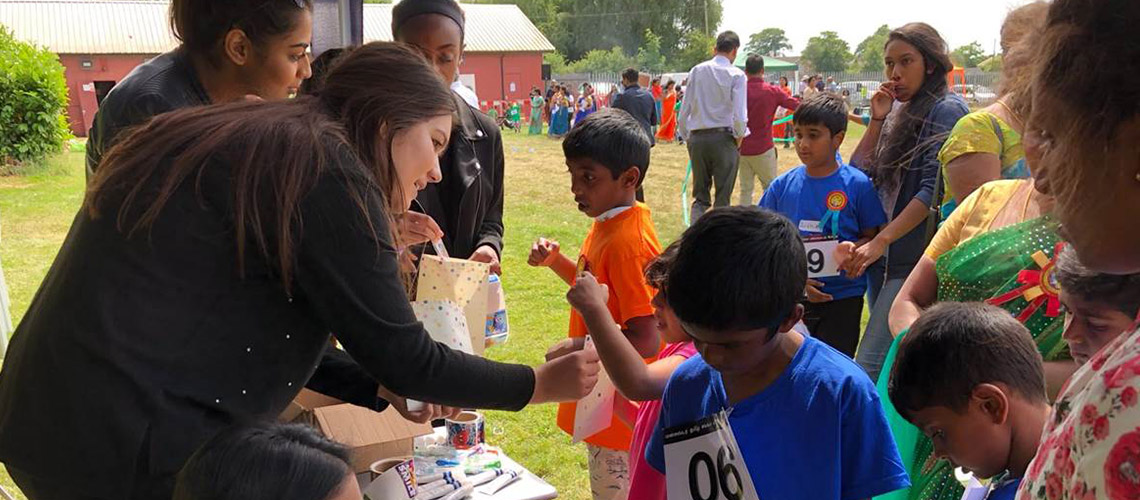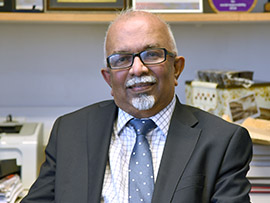Making a difference through dentistry
For a quarter of a century, Sri Lanka endured a civil war that left deep scars across its communities and healthcare systems. In recent years, an ambitious set of oral health initiatives, driven by The University of Manchester in partnership with Manchester University NHS Foundation Trust, has emerged to support post-conflict recovery, improve professional education, and build a more equitable global health landscape.

One of the key figures involved in shaping this work is Professor Raj Ariyaratnam, whose personal journey from Sri Lanka to Manchester has come full circle through his leadership in global health and dental education.
Rebuilding through education
In 2011, a team from Manchester launched a continuing professional development (CPD) programme in northern Sri Lanka, designed to reconnect local clinicians with current medical knowledge after decades of isolation caused by conflict. What began as a series of guest lectures has since grown into a flagship training programme that has supported dozens of professionals, including five newly qualified oral health consultants.
Now in its 15th year, the CPD programme has laid the groundwork for the creation of the Institute of Oral Health Care Sciences (IOHCS) in Jaffna. Due to open later this year, the institute is backed by The University of Manchester, the University of Jaffna, and local health services, and is set to become a hub for oral health education, research, and international collaboration.

Dr Raj Ariyaratnam
Raj is the clinical academic lead for oral medicine and the lead for social responsibility in the Division of Dentistry.
The development of the IOHCS also represents a milestone in Manchester’s global engagement strategy, further deepening ties with partners in the Global South and expanding opportunities for student exchanges and joint research.
Supporting the local community
While much of the work has focused on global outreach, the programme has also delivered tangible benefits closer to home.
In Greater Manchester, students from the University’s dentistry courses are tackling oral health inequalities head-on. One project, now embedded in the BDS dentistry degree, trains students to treat patients in hard-to-reach communities. Another voluntary initiative sees students working with charities to deliver care to homeless populations, low-income families, and international communities in need.
Language barriers have also been identified as a key issue preventing people in multilingual communities from accessing proper care. Drawing on the rich diversity of Manchester’s population, a pilot programme matching dental students with local communities based on shared language and dialect has already shown promising results, starting with the Tamil community and expanding further afield.
Building bridges across borders
As the global component of the programme has evolved, technology has played a crucial role in sustaining momentum and expanding access.
“This work isn’t just about training dentists. It’s about healing communities, building trust, and showing how education can truly transform lives - locally and globally.”
With support from the University’s IT teams, the Global Online Learning Forum (GOLF) was developed to deliver interactive live lectures to clinicians across the world. Initially created for professionals in Sri Lanka, the platform has since grown to include participants from Nigeria, Kenya, South Africa and Egypt, offering flexible, high-quality education regardless of geography.
Formal academic partnerships are also progressing. A draft memorandum of understanding with the University of Peradeniya, Sri Lanka’s leading dental school, sets the stage for shared curricula, student placements and joint research. Accommodation plans for Manchester students have already been approved, and exchanges will begin in the upcoming academic year.
Education that transforms lives
Through a mix of outreach, innovation and partnership, Manchester’s global dentistry work is helping to reshape both local and international landscapes of oral healthcare. The work has been recognised with awards for teaching innovation and social responsibility, but its true impact lies in the communities it serves and the lives it improves.
“This work isn’t just about training dentists,” says Professor Ariyaratnam. “It’s about healing communities, building trust, and showing how education can truly transform lives - locally and globally.”
And while the story may have started in Sri Lanka, the ripple effects are being felt far beyond.
Find out more about studying dentistry at The University of Manchester, and about service learning initiatives involving our dentistry students.
